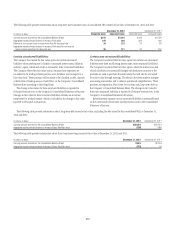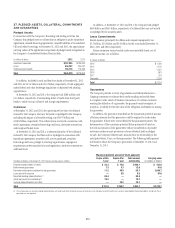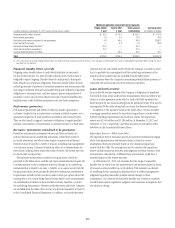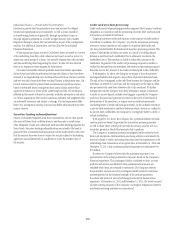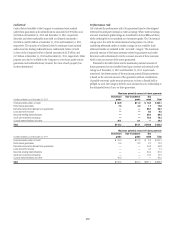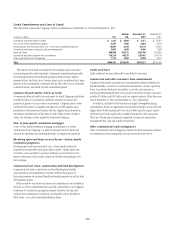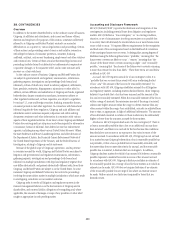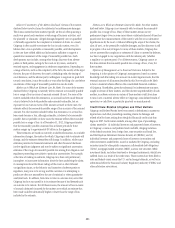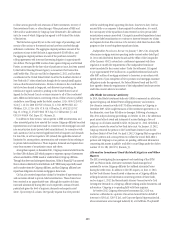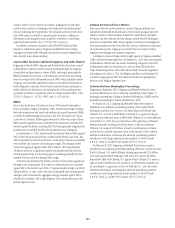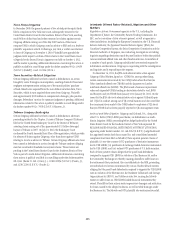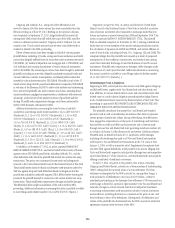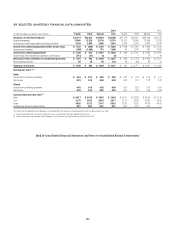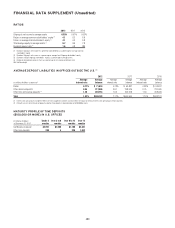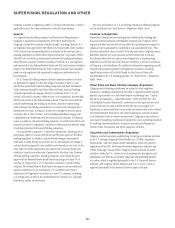Citibank 2012 Annual Report Download - page 302
Download and view the complete annual report
Please find page 302 of the 2012 Citibank annual report below. You can navigate through the pages in the report by either clicking on the pages listed below, or by using the keyword search tool below to find specific information within the annual report.280
28. CONTINGENCIES
Overview
In addition to the matters described below, in the ordinary course of business,
Citigroup, its affiliates and subsidiaries, and current and former officers,
directors and employees (for purposes of this section, sometimes collectively
referred to as Citigroup and Related Parties) routinely are named as
defendants in, or as parties to, various legal actions and proceedings. Certain
of these actions and proceedings assert claims or seek relief in connection
with alleged violations of consumer protection, securities, banking,
antifraud, antitrust, anti-money laundering, employment and other statutory
and common laws. Certain of these actual or threatened legal actions and
proceedings include claims for substantial or indeterminate compensatory
or punitive damages, or for injunctive relief, and in some instances seek
recovery on a class-wide basis.
In the ordinary course of business, Citigroup and Related Parties also
are subject to governmental and regulatory examinations, information-
gathering requests, investigations and proceedings (both formal and
informal), certain of which may result in adverse judgments, settlements,
fines, penalties, restitution, disgorgement, injunctions or other relief. In
addition, certain affiliates and subsidiaries of Citigroup are banks, registered
broker-dealers, futures commission merchants, investment advisers or
other regulated entities and, in those capacities, are subject to regulation
by various U.S., state and foreign securities, banking, commodity futures,
consumer protection and other regulators. In connection with formal and
informal inquiries by these regulators, Citigroup and such affiliates and
subsidiaries receive numerous requests, subpoenas and orders seeking
documents, testimony and other information in connection with various
aspects of their regulated activities. From time to time Citigroup and Related
Parties also receive grand jury subpoenas and other requests for information
or assistance, formal or informal, from federal or state law enforcement
agencies, including among others various United States Attorneys’ Offices,
the Asset Forfeiture and Money Laundering Section and other divisions of
the Department of Justice, the Financial Crimes Enforcement Network of
the United States Department of the Treasury, and the Federal Bureau of
Investigation, relating to Citigroup and its customers.
Because of the global scope of Citigroup’s operations, and its presence
in countries around the world, Citigroup and Related Parties are subject to
litigation and governmental and regulatory examinations, information-
gathering requests, investigations and proceedings (both formal and
informal) in multiple jurisdictions with legal and regulatory regimes that
may differ substantially, and present substantially different risks, from those
Citigroup and Related Parties are subject to in the United States. In some
instances Citigroup and Related Parties may be involved in proceedings
involving the same subject matter in multiple jurisdictions, which may result
in overlapping, cumulative or inconsistent outcomes.
Citigroup seeks to resolve all litigation and regulatory matters in the
manner management believes is in the best interests of Citigroup and its
shareholders, and contests liability, allegations of wrongdoing and, where
applicable, the amount of damages or scope of any penalties or other relief
sought as appropriate in each pending matter.
Accounting and Disclosure Framework
ASC 450 (formerly SFAS 5) governs the disclosure and recognition of loss
contingencies, including potential losses from litigation and regulatory
matters. ASC 450 defines a “loss contingency” as “an existing condition,
situation, or set of circumstances involving uncertainty as to possible loss
to an entity that will ultimately be resolved when one or more future events
occur or fail to occur.” It imposes different requirements for the recognition
and disclosure of loss contingencies based on the likelihood of occurrence
of the contingent future event or events. It distinguishes among degrees of
likelihood using the following three terms: “probable,” meaning that “the
future event or events are likely to occur”; “remote,” meaning that “the
chance of the future event or events occurring is slight”; and “reasonably
possible,” meaning that “the chance of the future event or events occurring
is more than remote but less than likely.” These three terms are used below
as defined in ASC 450.
Accruals. ASC 450 requires accrual for a loss contingency when it is
“probable that one or more future events will occur confirming the fact
of loss” and “the amount of the loss can be reasonably estimated.” In
accordance with ASC 450, Citigroup establishes accruals for all litigation
and regulatory matters, including matters disclosed herein, when Citigroup
believes it is probable that a loss has been incurred and the amount of the
loss can be reasonably estimated. When the reasonable estimate of the loss is
within a range of amounts, the minimum amount of the range is accrued,
unless some higher amount within the range is a better estimate than any
other amount within the range. Once established, accruals are adjusted from
time to time, as appropriate, in light of additional information. The amount
of loss ultimately incurred in relation to those matters may be substantially
higher or lower than the amounts accrued for those matters.
Disclosure. ASC 450 requires disclosure of a loss contingency if “there is
at least a reasonable possibility that a loss or an additional loss may have
been incurred” and there is no accrual for the loss because the conditions
described above are not met or an exposure to loss exists in excess of the
amount accrued. In accordance with ASC 450, if Citigroup has not accrued
for a matter because Citigroup believes that a loss is reasonably possible but
not probable, or that a loss is probable but not reasonably estimable, and
the matter thus does not meet the criteria for accrual, and the reasonably
possible loss is material, it discloses the loss contingency. In addition,
Citigroup discloses matters for which it has accrued if it believes a reasonably
possible exposure to material loss exists in excess of the amount accrued.
In accordance with ASC 450, Citigroup’s disclosure includes an estimate of
the reasonably possible loss or range of loss for those matters as to which an
estimate can be made. ASC 450 does not require disclosure of an estimate
of the reasonably possible loss or range of loss where an estimate cannot
be made. Neither accrual nor disclosure is required for losses that are
deemed remote.





